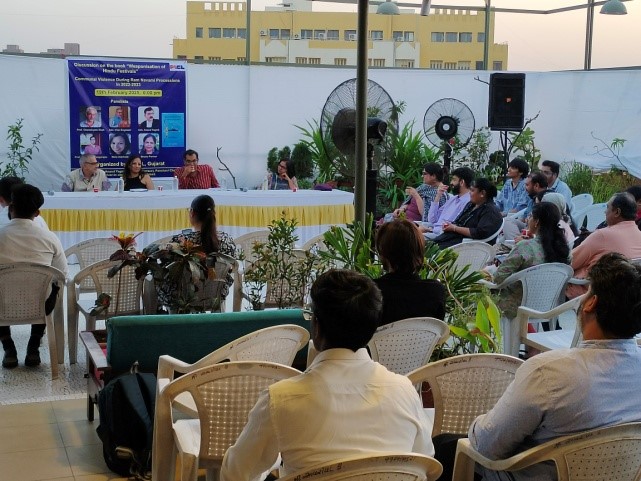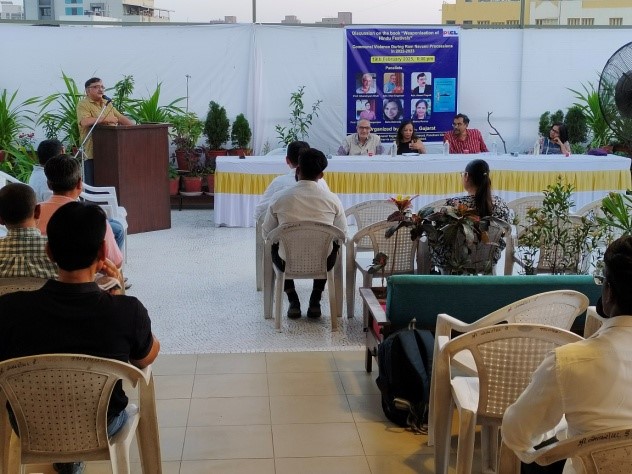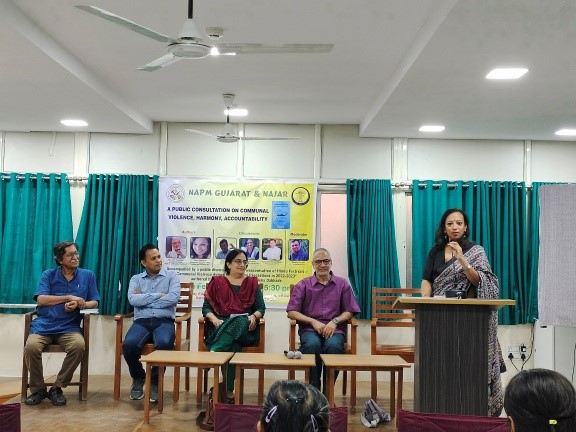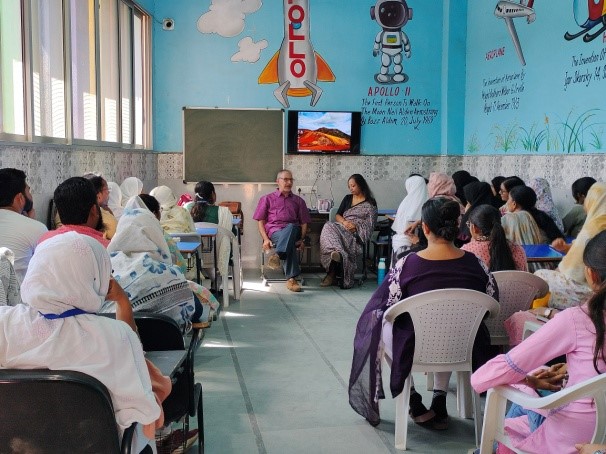Discussion on the Book “Weaponisation of Hindu Festivals” –Communal Violence during Ram Navami Processions in 2022-2023
On 21st February 2025, Buniyaad organized a thought-provoking discussion on the book “Weaponisation of Hindu Festivals: Communal Violence During 2022-2023” at Punaruththan Hall, Ahmedabad. The event witnessed the participation of over 50 individuals from diverse backgrounds, including Dalit, Muslim, and OBC communities, highlighting the collective concern and interest in understanding the politics of communal violence in contemporary India. The discussion was structured as a panel conversation and featured a range of distinguished speakers including Neha Dabhade, author of the book, writer and researcher, Irfan Engineer, author of the book, writer and social activist, Aatish Indrekar, social activist and theatre practitioner, Tasnim Bharmal, academic and researcher, Deepak Solanki, social activist.
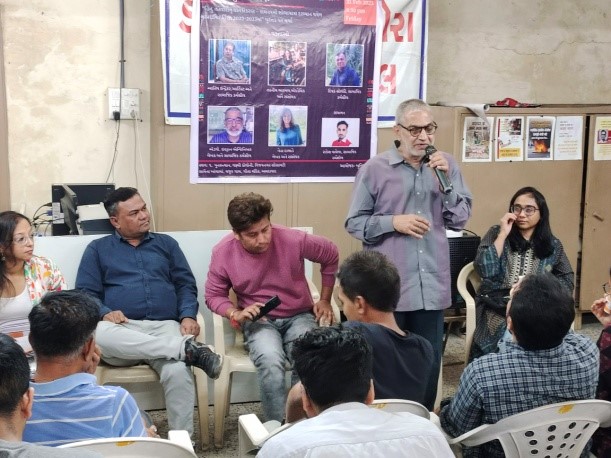 The session began with an in-depth presentation by Neha Dabhade, who outlined the major arguments of the book and explored the political motives behind the recurring communal violence, particularly focusing on incidents during Ram Navami celebrations. She highlighted how religious festivals, traditionally meant to foster community and devotion, have been systematically turned into instruments of provocation, impunity, and political assertion.
The session began with an in-depth presentation by Neha Dabhade, who outlined the major arguments of the book and explored the political motives behind the recurring communal violence, particularly focusing on incidents during Ram Navami celebrations. She highlighted how religious festivals, traditionally meant to foster community and devotion, have been systematically turned into instruments of provocation, impunity, and political assertion.
Aatish Indrekar and Deepak Solanki contributed by discussing specific incidents that occurred in Gujarat. They emphasized the dangerous trend of pitting marginalized communities against each other, often using symbolic festivals like Ram Navami as flashpoints. Their reflections illustrated how communal violence is not spontaneous but orchestrated through calculated narratives and systemic impunity.
Tasnim Bharmal offered a critical reading of the book, identifying the deliberate strategies used to incite riots. She examined how religious festivals are being increasingly politicized, transformed into events of hyper-masculine pride and aggressive assertion, which in turn fuel polarization and violence.
Irfan Engineer concluded the panel with a comprehensive analysis of the mechanisms behind communal violence, drawing from years of documentation and grassroots engagement. He stressed the importance of resisting hate-driven politics and emphasized the role of civil society in building bridges and nurturing communal harmony.
Following the panel discussion, an engaging Q&A session allowed participants to raise their concerns, share perspectives, and deepen their understanding of the complex socio-political dynamics involved. The conversation reached to the critical reflection and collective introspection among attendees.
The entire program was skillfully anchored by Rakesh Vaghela from Buniyaad, who ensured the smooth flow of the discussion and encouraged inclusive participation.
The primary objective of this event was to build a nuanced understanding of the politics underlying communal violence and to explore pathways for promoting peace and communal harmony. It aimed at equipping community leaders, activists, and concerned citizens with knowledge and critical tools to counter hate and uphold the values of pluralism and justice.
Discussion on the Book “Weaponisation of Hindu Festivals” –Communal Violence during Ram Navami Processions in 2022-2023 : Dates: 19th and 20th February 2025
A two-day book discussion was organized in Ahmedabad on 19th and 20th February 2025 by the People’s Union for Civil Liberties (PUCL) Gujarat Chapter and the National Alliance of People’s Movements (NAPM) Gujarat Chapter. The discussions focused on understanding the politics of communal violence during Ramnavami, patterns of riots, and the need for collective accountability and harmony.
19th February 2025- PUCL Program
The first day of the discussion, held on 19th February, was organized by PUCL at the terrace of Advocate Anand Yagnik’s residence, located on Drive-In Cinema Road, Ahmedabad. The panel for the day included: Advocate Anand Yagnik, Prof. Raghu Rangarajan, Bhanu Parmar, Neha Dabhade, and Irfan Engineer, author of the book.
The program was moderated by Mujahid Nafees, General Secretary of PUCL Gujarat. The discussion explored the broader political context of communal violence in India, particularly focusing on Gujarat. The authors highlighted the recurring and evolving patterns of violence observed during religious processions, especially during Ram Navami. Over 70 participants attended the PUCL event, engaging in a rich and critical dialogue.
20th February 2025- NAPM Program
On 20th February, the second session was hosted by NAPM at the Community Education House on Ashram Road, Ahmedabad. The panelists for the day included: Ashim Roy, veteran trade unionist, Dr. Jharna Pathak, feminist and research scholar, Advocate Shamshad Pathan.
The discussion was moderated by Deepak Solanki, a social activist. The speakers delved into the historical trajectory of communal riots in Gujarat, examining their socio-political underpinnings and the recent emergence of violent incidents during Ram Navami processions. The conversation also focused on the role of civil society in fostering harmony and holding state mechanisms accountable.
Key points from the discussions:
- The book’s analysis of communal violence across India, with a specific lens on Gujarat’s history
- The emerging patterns of violence around religious festivals, particularly Ram Navami
- The importance of historical memory and public accountability in addressing communal tensions
- The need for civil society to remain vigilant and proactive in building communal harmony
The authors, Neha Dabhade and Irfan Engineer, emphasized how similar incidents are taking place across the country, pointing to an orchestrated pattern rather than isolated cases of violence. Approximately 30 individuals participated in the NAPM session, contributing to an intimate and reflective discussion.
The two-day book discussion succeeded in bringing together legal experts, scholars, activists, and community members to engage in critical reflection on communal violence in India. Both programs served as important platforms for analyzing current trends, sharing local and national experiences, and reinforcing the urgency of collective action toward peace, justice, and communal harmony. The discussions also fostered solidarity, collaboration and facilitated outreach with various organizations committed to justice, peace, and communal harmony.
Talk on Diversity at Apollo School- 20th February 2025, Venue: Apollo School, Ahmedabad
On 20th February 2025, a talk on the theme of “Celebrating Diversity” was organized at Apollo School, Ahmedabad, with the active participation of over 40 teachers. The session was a part of an ongoing engagement with the school aimed at strengthening values of inclusion and understanding within the educational environment. It was held in the early morning by 10:00 am to 12:00 pm.
The talk was delivered by Irfan Engineer, a renowned scholar and Director of the Centre for Study of Society and Secularism (CSSS), and the discussion was facilitated by Neha Dabhade, Deputy Director at CSSS. The session aimed to enhance the teachers’ understanding of the multifaceted diversity that exists within Indian society, thereby equipping them to foster a more inclusive and respectful learning environment for their students.
Irfan Engineer used a detailed PowerPoint presentation to highlight the vast and layered nature of diversity in India—not just religious, but also linguistic, cultural, culinary, traditional, and artistic. He emphasized: The richness of regional languages and dialects, Cultural variations in dress, customs, and festivals, The diversity in food practices across different communities, Literary and spiritual traditions such as Sufi saints, Bhakti poets, Pandits, and scholars from various backgrounds, Diversity within the same religious communities, showcasing internal pluralities.
The talk encouraged participants to reflect on their own identities and experiences, and how these intersect with broader social narratives. It also emphasized the importance of imparting these values to students, particularly in times when communal divisions are becoming more visible.
The session was interactive and reflective, with teachers engaging in questions and discussions around classroom practices, biases, and strategies to promote respect for diversity among students.
This program is part of a continuous collaboration with Apollo School, aimed at deepening the values of secularism, pluralism, and empathy in education. The session helped further strengthen the relationship between Buniyaad (peace center) and the school, paving the way for future workshops and joint initiatives.

